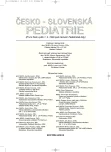-
Medical journals
- Career
Lactose Intolerance
Authors: P. Frühauf
Authors‘ workplace: Klinika dětského a dorostového lékařství UK 1. LF a VFN, Praha přednosta prof. MUDr. J. Zeman, DrSc.
Published in: Čes-slov Pediat 2010; 65 (3): 126-131.
Category: Review
Overview
Lactose intolerance is a quite frequent disease, which rarely appears as a congenital form immediately after birth. However, more often is expressed as so-called adult type characterized as a spontaneously diminishing lactase activity in the small intestine after weaning. The prevalence of lactose intolerance is about 10–15 % in European population.
Lactose intolerance can also manifest as a secondary distress following other small intestine disorders such as severe gastroenteritis, celiac disease, symptoms following resections of small intestine etc. The treatment is based on reduction or even elimination of lactose in diet.Key words:
lactose, lactose intolerance, milk intolerance
Sources
1. Campbell AK, Matthews SB. Darwin’s illnes revealed. Postgrad. Med. J. 2005; 81 : 248–251.
2. Dekker JD,Einerhand WC, Büller H. Carbohydrate malabsorption. In: Lifschitz CH. Pediatric Gastroenterology nad Nutrition in Clinical Practice. New York: Marcel Dekker, 2002 : 399–373.
3. Semeza G, Auricchio S. The laktase story: from physiopathology to biochemistry, molecular and cell biology – and back? In: Gracey M, Kretchmer N, Rossi E (ed). Sugars in Nutrition. New York: Raven Press, 1991 : 93–102.
4. Kocián J. Osteoporóza a osteomalacie. Praha: Triton, 1995 : 25–53.
5. Simoons FJ. Primary adult laktose intolerance and the milking habit a problem in biological nad cultural interrelations II. A culture historical hypothesis. Am. J. Digest. Dis. 1970; 15 : 695–710.
6. Brines J. Adult lactose tolerance is not an advantageous evolutionary trait. Pediatrics 2004; 114 : 1372.
7. Fomon SJ. Assesement of growth of formula-fed infants: evolutionary considerations. Pediatrics 2004; 113 : 389–395.
8. Kuakkanen M, Enattah NS, Oksanen A, Savialahti E, Orpana A, Järvelä I. Transcriptional regulation of laktase-phlorizin hydrolyse gene by polymorphism associated with adult-type hypolactasia. Gut 2003; 52 : 647–652.
9. Troelsen JT, Olsen J, Miller J, Sjorstrom H. An upstream polymorphism associated with laktase persistence has increased aktivity. Gastroenterology 2003; 125 : 1686–1694.
10. Hogenbauer Ch, Hamer HF, Mellitzer K, Renner W, Krejs GJ, Tiplal H. Evaluation of a new DNA test compared with the laktose hydrogen breath test for the diagnosis of laktase non-persistence. Eur. J. Gastroenterol. Hep. 2005; 17 : 371–376.
11. Bunning C, Genschel J, Jurga J, Fiedler T, Voderholzer W, Fiedler EM, Weltrich R, Lochs H, Schmidt H, Ockenga J. Introducing genetic testing for adult-type hypolactasia. Digestion 2005; 71 : 245–250.
12. Ridefelt P, Hakansson LD. Laktose intolerance: laktose tolerance test versus genotyping. Scand. J. Gastroenterol. 2005; 40 : 822–826.
13. Guandalini S. Prolonged diarrhoea: Etiology nad pathogenesis. Diarrheal Disease, Vevey Nestec, 1996 : 15–19.
14. Frühauf P. Přístup k pacientovi s bolestí břicha z pohledu pediatra. In: Lukáš K (ed). Gastroenterologie 2003 – Diferenciální diagnostika symptomatologie nemocí trávicího traktu. Praha: Triton, 2003 : 100–104.
15. Frühauf P. Recidivující bolesti břicha u dětí. In: Standard léčebného plánu, programy kvality a standardy léčebných postupů. 11. aktualizace. Praha: Verlag Dashöfer, 2004 : 1–14.
16. Fomon SJ. Nutrition of Normal Infants. St.Louis Mosby, 1993 : 185–186.
17. Murray RD, Kerzner B, MacLean WC Jr, McClung HJ, Gilbert M. Efficient storage system for breath hydrogen. J. Pediatr. Gastroenterol. Nutr. 1985; 4 : 711–713.
18. Levri KM, Ketvertis K, Deramo M, Merenstein JH, D’Amico F. Do probiotics reduce adult lactose intolerance? A systematic review. J. Fam. Pract. 2005; 54 : 613–620.
19. Saavedra JM, Abi-Hanna A. Clinical studies of probiotic agents. In: Hanson LA, Yolken RH (ed). Probiotics, Other Nutritional Factors and Intestinal Microflora. Philadelphia: Lippincot-Raven, 1999 : 271–286.
20. Shermak MA, Saavedra JM, Jackson TL, Juany SS, Bayless TM, Perman JA. Effect of yoghurt on symptoms and kinetics of hydrogen production in laktose-malabsorbing children. Am. J. Clin. Nutr. 1995; 62 : 1003–1006.
21. Gibbon PR, Shepherd SJ. Personal view: food for thought – western lifestyle and susceptibility to Crohn’s disease. The FODMAP hypothesis. Aliment. Pharmacol. Ther. 2005; 21 : 1399–1409.
Labels
Neonatology Paediatrics General practitioner for children and adolescents
Article was published inCzech-Slovak Pediatrics

2010 Issue 3-
All articles in this issue
- Delayed Puberty Onset and Short Stature as First Signs of Swyer’s Syndrome?
- Natal and Neonatal Teeth
- Lactose Intolerance
- Acute Injury in Children – Therapy and Prognosis
- Possibilities of Spa Therapy in the Filip’s Sanatorium in Poděbrady
- Chromosome Studies in Neonates of the Prešov Region (Slovakia)
- Czech-Slovak Pediatrics
- Journal archive
- Current issue
- Online only
- About the journal
Most read in this issue- Lactose Intolerance
- Acute Injury in Children – Therapy and Prognosis
- Delayed Puberty Onset and Short Stature as First Signs of Swyer’s Syndrome?
- Natal and Neonatal Teeth
Login#ADS_BOTTOM_SCRIPTS#Forgotten passwordEnter the email address that you registered with. We will send you instructions on how to set a new password.
- Career

